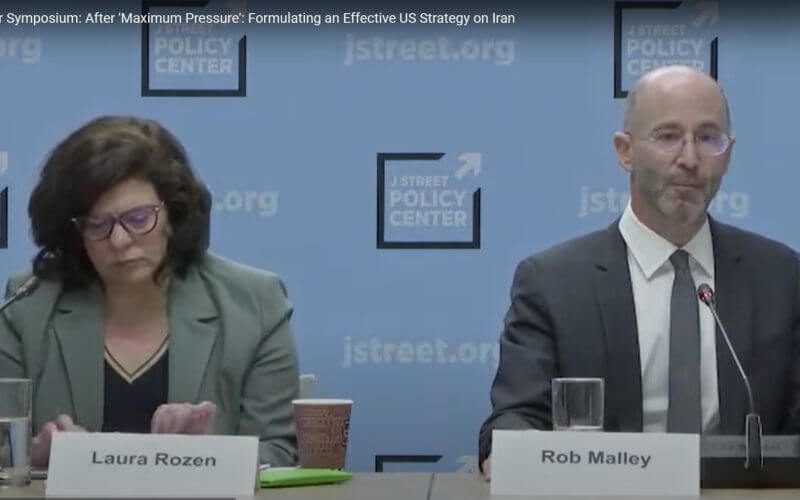A new video has emerged of an early March Roundtable at the Progressive, Left-leaning political advocacy group, J-Street in which pro-Iran regime lobbyists met with members of the Biden administration to address the regime in Iran and a potential nuclear deal, according to Gabriel Noronha, a former United States State Department advisor on Iran and fellow at the Jewish Institute for National Security of America (JINSA), who posted the video to social media.
According to the J-Street Symposium report, the March Roundtable participants included U.S. Iran Envoy Robert Malley, J-Street president Jeremy Ben-Ami, Ryan Costello from the National Iranian American Council (NIAC), Trita Parsi, co-founder and executive vice president of the Quincy Institute for Responsible Statecraft, and the founder and former president of the National Iranian American Council (NIAC), an organization with ties to current and former Islamic Republic officials, as well as other experts and scholars from Left-leaning institutions.
Malley previously worked with NIAC and J-Street during the Obama administration, leading to the 2015 nuclear agreement between Washington and Tehran. The agreement allowed Tehran to obtain sanctions relief in exchange for "moderating."
Since the agreement's creation and cancellation, new reports revealed that the regime lied to the international community about its nuclear ambitions, stockpiling atomic material to weapons grade while escalating tensions in the Middle East using terrorism.
"It is troubling that Rob Malley had plenty of time to address a group of analysts but has avoided testifying before Congress for two months now," Noronha told The Foreign Desk. The Foreign Desk has viewed the YouTube video of the two-hour symposium.
The symposium report highlights several steps the Biden administration include maintaining proactive diplomacy on the prisoner release, nuclear de-escalation through complementary mutual actions, searching for a narrow multilateral non-proliferation agreement alongside prisoner releases and de-escalatory measures, calling on the regime to act in good faith on nuclear de-escalation and ending its supply of military drones and weaponry to Russia, maintain military deterrence, and encouraging regionally-led diplomacy on a bevy of issues.
"Mr. Malley's refusal to engage with either Iranian dissidents or the many bipartisan critics of the administration's Iran policy reflects that they have reneged on their commitment to having a 'diversity of views' on their teams, as Secretary Blinken originally promised to Congress," Noronha said.
He added that the only analysts and experts Malley seems to engage with are those who "have a troubled history of defending and apologizing for the actions of the Iranian regime."
In one of the video clips posted by Noronha to Twitter, Tess Bridgeman, a former Obama administration official who worked on the JCPOA, detainee issues, and issues at the Obama National Security Council's Office of Legal Advisor, said the only viable path right now is "discretionary measures on either side."
According to Noronha and other experts on Twitter, Bridgeman helped the Obama administration transfer funds to the regime in Tehran following the 2015 nuclear agreement's creation.
Bridgeman went on to explain that with the 2024 Presidential elections coming up soon, the administration will not do anything that requires a Congressional vote, arguing that it is "important to keep in mind as we are proposing alternatives that they are in that realm of discretionary unilateral gestures good-faith measures."
"There will be much diplomacy underpinning it. I am not saying it should be uncoordinated, but something that is written down on a piece of paper for all sides to implement is a recipe for Congress, making it impossible," Bridgeman said during the meeting.
The former Obama administration official added that the real failure of the nuclear agreement besides pulling out was "failing to make sanctions relief meaningful." Bridgemen explained that a new format should include more meaningful sanctions relief sold differently as "relief for the Iranian people."
The former Obama official described the notion of sanctions to punish the regime as "spin," arguing that there is "smart commentary pointing the other direction, including from some Iranians in exile that the sanctions are hurting ordinary Iranians' ability to function as a middle class."
She added that sanctions relief could be painted as providing Iranians "breathing space to organize, to be able to live their daily lives and survive in light of what the regime is willing to do to oppress them."
"It is a tact that hasn't been taken yet and might be harder to argue against because there is so much concern for what is going on to the Iranian people in light of the repression," Bridgeman explained.
Bridgeman concluded her thoughts by saying that one way to think about what a new deal with Iran is to reframe "the way sanctions relief is talked about in public."
Related Story: Another Iran Nuclear Deal Imminent?









